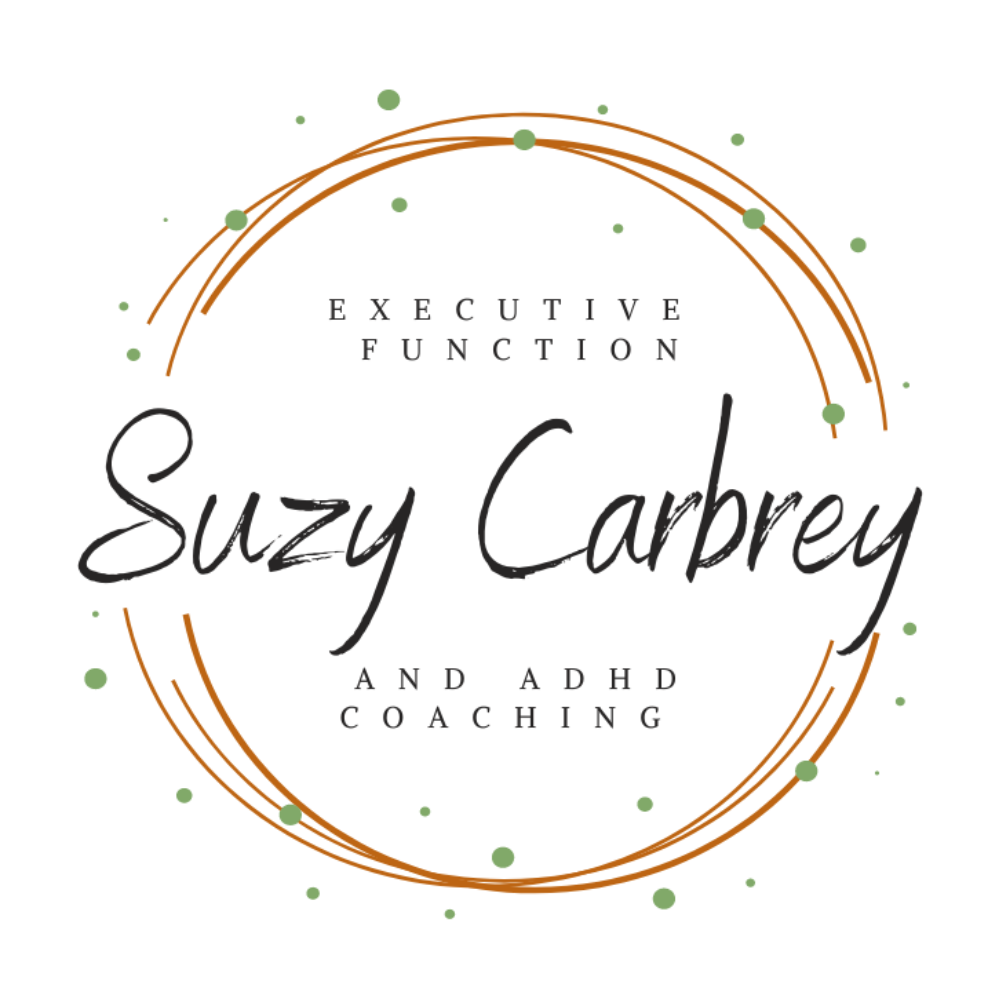Perfectionism is a common challenge for many adults with executive functioning (EF) struggles, including those with ADHD. While striving for excellence can be motivating in some contexts, perfectionism can quickly spiral into procrastination, self-doubt, and feelings of overwhelm. This blog post explores the dynamics of perfectionism, its connection to procrastination, and how individuals can use self-talk to overcome the mental blocks that prevent them from starting tasks before they feel “ready.” Understanding the root causes and implementing strategies to break free from perfectionism can help individuals move forward, reduce stress, and accomplish their goals more effectively.
What is Perfectionism?
Perfectionism is the belief that any task, project, or personal accomplishment must be flawless. It’s the idea that anything less than perfect is a failure. Perfectionists often set excessively high standards for themselves and others, creating unrealistic expectations and pressure to succeed. While perfectionism may sound like a positive trait, it can be paralyzing and counterproductive. When tasks feel too daunting or mistakes seem unacceptable, individuals may avoid starting or completing them altogether, falling into procrastination patterns.
In particular, individuals with ADHD are often more prone to perfectionism because of challenges related to executive functioning, such as time management, impulse control, and sustained focus. These challenges can amplify feelings of self-doubt and the pressure to do everything “perfectly” on the first try. As a result, many adults with ADHD might experience chronic procrastination, which only exacerbates their sense of being overwhelmed.
Front-End vs. Back-End Perfectionism
Understanding the different types of perfectionism can be a helpful step in managing it. Perfectionism can manifest in two primary ways: front-end and back-end perfectionism.
Front-End Perfectionism
Front-end perfectionism is when a person gets stuck in the planning and preparation phases of a task. The person may spend excessive time thinking about or refining their approach before they actually start. This type of perfectionism often leads to overthinking and paralysis by analysis. The fear of not doing things “right” from the very beginning can delay starting the task altogether.
For example, a person might spend days drafting and revising an email, trying to get every word just right, without actually sending it. Or, someone might delay beginning a workout regimen because they can’t seem to figure out the “perfect” routine. This type of perfectionism leads to inefficiency, as the time spent on planning becomes disproportionate to the actual work being done.
Back-End Perfectionism
Back-end perfectionism occurs after a task has started or even been completed. This form of perfectionism involves an overwhelming desire to go back and make improvements or corrections. In many cases, the task might be fine as it is, but the perfectionist mind will look for ways to enhance it or make it more “perfect.” This type of perfectionism often leads to endless revisions or checking and rechecking, preventing the person from moving on to the next task or project.
In the workplace, for example, someone might spend extra time editing a report after it’s already been submitted or feel the need to double-check an email after it’s already been sent. The urge to keep refining and perfecting can become a source of frustration, as it feels like the work is never truly “done.” Back-end perfectionism can also contribute to procrastination by creating mental roadblocks that prevent individuals from wrapping up tasks and moving on to new ones.
Perfectionism as a Key Cause of Procrastination
Perfectionism and procrastination often go hand-in-hand, especially for adults with ADHD. This connection can be understood through the lens of executive functioning challenges, such as difficulty managing time, planning, and prioritizing.
For many people with ADHD, the mental effort required to achieve perfection can feel exhausting. As a result, they may put off tasks in an attempt to avoid the discomfort of trying to meet impossible standards. In other words, the perfectionist mind resists starting or finishing a task because the fear of not doing it perfectly seems too overwhelming.
Procrastination occurs because of the emotional discomfort that perfectionism creates. The need to start a task but the inability to meet the high standards we’ve set for ourselves often leads to task avoidance. Even if the task itself is not inherently difficult, the fear of making a mistake or not performing at a high level is so distressing that it becomes easier to put it off entirely. Unfortunately, this cycle of avoidance only increases anxiety and stress, perpetuating the procrastination pattern.

Knowing When "Good Enough" is Enough
One powerful strategy for combating perfectionism is to recognize that “good enough” is often sufficient. The concept of perfection can be paralyzing because it sets an unrealistic standard that most tasks do not need to meet. Many tasks can be completed to a satisfactory degree without needing to be flawless. Learning to recognize when something is “good enough” is an essential skill for adults with ADHD and executive functioning challenges.
Not every task requires perfection, and many things are better off done imperfectly than left undone. In fact, anything worth doing is worth doing just good enough—and the key here is to be intentional about deciding what “good enough” looks like for each task. The question you need to ask yourself is: What is the minimum standard I need to meet for this task to be considered done? It’s helpful to think of this in terms of what the goal of the task is.
For example:
- For an email, the goal might be to communicate your message clearly, not to craft the perfect, grammatically flawless note.
- For a presentation, the goal might be to share your ideas with your audience, not to deliver it with perfect smoothness and without any ums or pauses.
- For a household chore, the goal might be to tidy up enough that the space is functional and comfortable, not pristine.
Setting a Range of "Good Enough"
When thinking about how to approach a task, consider a range of what “good enough” might look like. On the one hand, you have the minimum that you would be satisfied with to finish the task—what you could call the bare minimum. On the other hand, if you had more time and resources, you could do more or make it closer to perfection. However, by deciding on this range and using a specific max time limit or due date, you can avoid getting stuck in perfectionism. You’ll know when it’s time to stop refining and just get the task done.
For example, if you’re preparing a report:
- Minimum good enough: The report includes all the required sections and conveys your main points clearly, but may not have perfect formatting or every minor detail.
- Maximum (ideal): The report is polished with the best formatting, detailed data, and refined language.
- Max time: You set a time limit (e.g., 90 minutes) to work on the report, knowing you need to wrap it up by that time and move on.
This approach helps avoid the trap of endless revisions and the frustration of spending too much time on something that doesn’t require perfection.
The Freedom of "Good Enough"
Learning to embrace “good enough” is liberating. It removes the need for everything to be flawless and allows you to move forward, checking tasks off your to-do list and reducing the mental burden that perfectionism imposes. It’s essential to see this as freedom—the freedom to make progress, the freedom to take action without waiting for the perfect moment, and the freedom to let go of self-criticism.
It may seem difficult at first, especially for those who are used to high standards and internal pressure, but it’s possible to get there incrementally. The journey involves practicing self-compassion and self-forgiveness—understanding that imperfection is part of the process of living a balanced, productive life.
How to Get There Incrementally
Getting to the point where you are comfortable with “good enough” requires gradual practice. Here are some tips for moving toward this mindset:
- Start Small: Choose a task that you feel comfortable practicing imperfection with. It could be something small, like tidying up a room or writing a short email. Start by setting a time limit and sticking to it. Aim for the minimum good enough, not perfection.
- Embrace Mistakes as Learning Opportunities: Instead of worrying about doing something wrong, see mistakes as opportunities for growth. This shift in perspective will help you move away from perfectionism and towards progress.
- Use Self-Talk to Refocus: When you catch yourself trying to make something perfect, remind yourself that you don’t need to spend extra time refining. Use phrases like, “I can always improve it later,” or “The goal is progress, not perfection.”
- Set Boundaries with Time: Assign a clear timeframe or deadline to each task. When the time is up, stop working on it, regardless of whether it’s perfect. This creates a sense of urgency and prevents the task from dragging on endlessly.
- Celebrate Completion: Acknowledge and celebrate the satisfaction that comes from completing a task, even if it wasn’t perfect. Celebrate the progress, not just the outcome.

Conclusion
Perfectionism can be a major roadblock for adults with ADHD and executive functioning challenges, contributing to procrastination, overwhelm, and stress. However, by understanding how perfectionism manifests in both front-end and back-end ways, and by using self-talk techniques to coach yourself into action, you can begin to break free from the cycle of avoidance. Shifting from a perfectionistic mindset to a progress-oriented approach can help you overcome procrastination and start taking steps toward achieving.
Learn more with Online Coaching for Executive Functioning / ADHD
Ready to gain control and enhance your executive functioning? As an experienced and compassionate coach, I specialize in providing support for executive functioning and ADHD. To embark on your journey, please reach out to me at 708-264-2899 or email hello@suzycarbrey.com to schedule a FREE 20-minute discovery call consultation.
With a background as a speech-language pathologist, I have a strong foundation in executive functioning coaching. My graduate degree program in SLP placed a significant emphasis on cognition, including executive functions, and I have years of experience in medical rehabilitation, providing cognitive-communication therapy. Additionally, I have completed an ADHD Services Provider certification program, I am Solutions-Focused Brief Therapy Diamond Level 1 certified and I am trained in the Seeing My Time® executive functioning curriculum.
Experience the convenience and effectiveness of online coaching, backed by studies that demonstrate equal results to in-person services. Parents, professionals, and emerging adults love the convenience and privacy of receiving coaching from their own homes.
Whether you reside in Chicago, Milwaukee, Indianapolis, Kansas City, or anywhere else around the globe, I am here to assist you. Schedule your discovery call consultation today, and I eagerly anticipate the opportunity to work with you!
Please note that although I am a certified speech-language pathologist, all services Suzy Carbrey LLC provides are strictly coaching and do not involve clinical evaluation or treatment services. If you require a formal speech therapy evaluation and treatment, please inform me, and I can provide appropriate recommendations.

